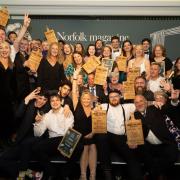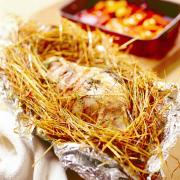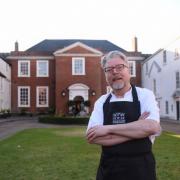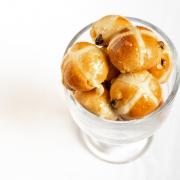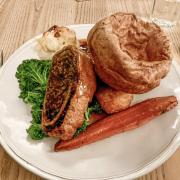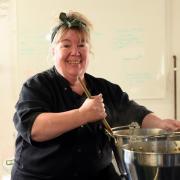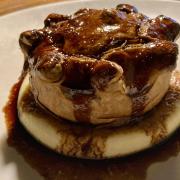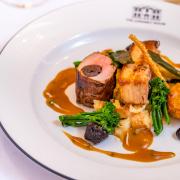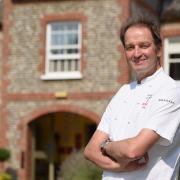He may have made his fame and fortune at double Michelin-starred gastropub The Hand and Flowers, but superstar chef Tom Kerridge had a springboard to success in Norfolk

From a kitchen the size of a modest cupboard, chef Tom Kerridge revolutionised the ideal of the Great British Pub. After taking over The Hand and Flowers in the leafy village of Marlow, Tom and his wife Beth set about transforming the establishment into Britain’s finest gastropub, a feat recognised by its award of two Michelin stars – a calibre of appreciation usually reserved for romantically-influenced, opulently-presented restaurants.
The man who can claim at least some credit for setting the young Tom on his way was Norfolk’s David Adlard, chef/patron of the eponymous Norwich restaurant and first man to earn a Michelin star in East Anglia. He gave Tom his first head chef role in 2003 and treated the young man to a valuable education in the entwining elements that make up a successful restaurant.
“I think the main thing I learned from David Adlard was the understanding of making your own business work – how to drive things forward in your own way… how to make decisions that are solely yours,” Tom explains.
“So it wasn’t just about learning how to be a chef, it was also about learning to be a businessman, about what to do and what not to do. He’d been a chef and business owner for 25 years and had made his fair share of mistakes, so I could pick his brain of all sorts of things.”

Over a decade later and the Hand and Flowers is still thriving on what Tom calls “unpretentious modern British flavours”; tastes and trends that stand alone without the need for trickery or odd, arrogant, flavour combinations.
“They’re all based, I suppose, on classic traditional dishes… all the mantras that you look at Great Britain and what it’s built around,” Tom says of his award-winning food. “Whether it’s manufacturing, whether it’s food, whether it’s farming, it’s all solid, rustic, heart and soul and honest and those are the sort of dishes that I find enthusiasm from.
“I look for tradition and I look for history in food and I like to build on that,” he continues. “Those classics that you can then almost reinvent into a modem way of cooking it. I‘m not trying to break down boundaries in looking for something new; I like to look to the old to see if we can improve on it.”
Balancing the dual expectations of creating exceptional food and building an astute knowledge of the current industry, Tom says, is something that increasing numbers of chefs in Britain are having to do in order to be successful.

“But that’s a great sign and a fantastic reflection of the British industry… that it’s not just all about getting the Michelin stars anymore,” he says. “It’s about all sorts of great foods cooked in a variety of great ways, but it’s also about making it work – whether it’s food that is cooked on coals or food that is served in a particular way, or whether it’s a 17-course tasting menu. There are so many great chefs out there, but they are also learning as businessmen the ways in which they can make work the longevity of their talent.”
And for Tom – who has long been at the forefront of the Great British food scene – one element reigns supreme when it comes to keeping cuisine diverse and exciting: the freshest ingredients, locally sourced from the wealth of riches that East Anglia (and surrounding areas) has to offer.
Tom has described his time in Norfolk with the man he regards as one of his culinary heroes as “a great education for me as a young chef getting to grips with British ingredients, not least because Norfolk grows some of the best produce in the UK – from arable crops to foraged veg, and farmed poultry to game.” It was a lesson he has not forgotten.
“I think food being about quality-led ingredients is always going to be the most important thing. Food has always been ingredients-led, it’s always been about where the produce came from, but now it doesn’t just have to be that you get that in the top hotels and restaurants. You can now get that from farmers’ markets, and chefs are at the forefront of that idea, helping drive it forward and raise the profile of it.
“But the British food scene is fantastic,” he adds. “There are so many people involved and making it work, from the producers and the suppliers, all the way down that food chain to chefs and people on television. Everyone is helping to raise the profile, everybody plays their little part.” And the diversity of ingredients at our disposal has never been greater. Indeed, during his time in Norfolk, Tom admits to becoming enchanted with the widespread culinary uses for one of the county’s noted exports.
“To a lot of people it seems a luxury but to me it’s an essential and that’s butter, or dairy,” he enthuses. “There are so many different things you can do with it – if used wisely it’s fantastic for seasoning or for lovely rich or salty cheeses. It can enhance dishes, it can go through desserts; butter is great for cooking in and cheeses go great in desserts or for making sauces. In terms of how I cook, dairy products are the peak, so that’s my big luxury.”
Tom recently turned 40, and over the course of the preceding years celebrated that milestone by shedding over 11st in weight, courtesy of a regime known as the Dopamine Diet. It’s crafted specifically for fans of the Great British menu who, the chef says, “are looking to implement an understanding of cooking that I’ve built over the last 25 years, and tricks of the trade that I already know.”
It’s the latest move in a well-trodden path of chefs turning towards the healthy side of culinary expertise, but make no mistake, whether opening his new restaurant in Knightsbridge or returning to humble beginnings in small Norfolk kitchen restaurants, the things Tom learned during his time in our county will, it seems, always influence his career thoughts.
“David Adlard once told me that if you go to work every day and it’s easy then you’re not learning enough,” he concludes. “If you’re at work and it’s really hard, then you’re pushing yourself.
“Being a chef is quite a short, sharp career - the hours are long and the graft is hard. There aren’t many 55-year-old chefs on the sauce section of a Michelin-starred restaurant! It’s almost like football – by the time you’re 40 you need to be looking at the management side, rather than playing or being in the kitchen! But whatever the future holds, as long as I’m learning I’ll be happy.”
Tom Kerridge’s Dopamine Diet is available now from Absolute Press. RRP £8.99
Adlard on Kerridge
David has not been surprised to see how the young chef’s career has blossomed. “He was a very good chef. He was very, very good in the kitchen, very good with the other chefs, instructing, helping them, developing them. He did a couple of public demonstrations and was very good - he just went from strength to strength.
“I think it did him a lot of good to see how an independent restaurant worked; I think he’d have stayed for longer but The Hand and Flowers came up and he was off!”
He recalls how Tom, understanding the value of local produce, would forage wild mushrooms for Adlard’s. He also recalls that in those days, that Tom was a substantial fellow.
“We had quite a small kitchen and he was a big lad,” he said. “When he put on an apron he’d extend it with cling film to make it fit!”






